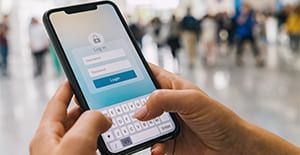How to Choose the Best Antivirus Software
Simplify your search for an antivirus software with this guide.
read morePublished on: August 1st, 2023

Cybersecurity threats are rampant, and if you’re uncareful, you might just compromise the information that is most valuable to you. To help avoid falling victim to data theft, this guide will identify the top five cybersecurity mistakes and how to address them.
Understanding the most common mistakes people make with their digital security is essential. It can feel impossible to cover all your digital bases, but being informed and taking simple steps can have a huge impact.

Using a simple or guessable password is like handing hackers the key to your accounts and sensitive data. You might assume they could never guess your birthdate or place, maiden name, or even childhood address, but hackers are pretty savvy! To avoid this, create strong passwords with a combination of uppercase and lowercase letters, numbers, and special characters. If you have trouble remembering difficult passwords, you may want to consider using a password manager. Not only can it store passwords for you, but it can also generate them.
You’ll want to regularly update your operating system, applications, and antivirus software because they most likely contain security patches. If possible, turn on automatic updates to ensure you never miss one.
Most online platforms offer multi-factor authentication options to bolster account security. Failing to enable MFA leaves your accounts susceptible to unauthorized access. Take advantage of this additional layer of protection by linking your accounts to a secondary verification method, such as a fingerprint, SMS code, or authentication app. This way, even if your username and password are compromised, hackers will still struggle to gain access.
Be wary of suspicious emails, messages, or links that prompt you to provide personal information or login credentials. Before you take action, look for red flags like misspellings, suspicious addresses, or urgent requests for personal information. Always remember that legitimate organizations will never ask for sensitive information like credit card info via email.
Public WiFi is convenient but also a hotspot for cybercriminals. When you connect to a public network, your information becomes vulnerable to eavesdropping and potential attacks. If you need to use public WiFi, make sure you aren’t accessing sensitive data, like banking details. You can use a VPN to encrypt your connection to protect yourself further.
Simple steps like using unique passwords and updating your devices can go a long way in preventing potential threats. However, as the landscape of cyber threats evolves, it’s best to work with a team of professionals for the best protection.
Computer Troubleshooters has a team of expert technicians ready to build a security plan that works for you. Find an office near you to learn more about our business and residential network security solutions.
Simplify your search for an antivirus software with this guide.
read moreHave you received this notorious Windows error screen? Here’s how to fix it.
read more© 2025 Computer Troubleshooters. Privacy Policy | Terms of Service | Accessibility Statement